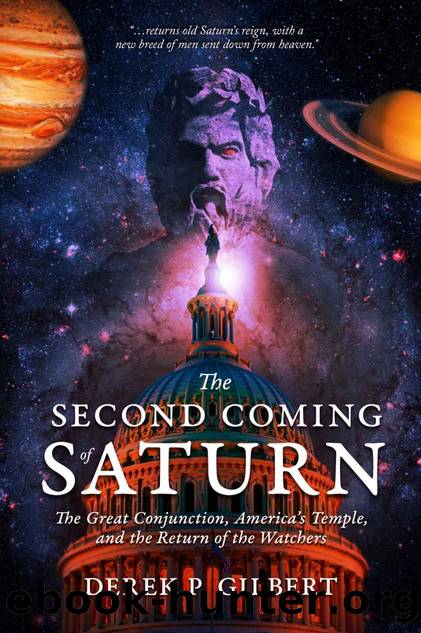The Second Coming of Saturn: The Great Conjunction, Americaâs Temple, and the Return of the Watchers by Derek P. Gilbert

Author:Derek P. Gilbert [Gilbert, Derek P.]
Language: eng
Format: mobi
Published: 2022-01-01T00:00:00+00:00
There are several important points to note in this passage. First, the word rendered âinquireâ (Hebrew dirshu) is translated âseekâ or âsearchâ about twice as often as âinquire.â Compare Isaiahâs words to the question asked by the angels of the women whoâd come to prepare the body of Jesus after dawn of the third day: âWhy do you seek the living among the dead?â[332] In other words, Isaiah condemned the people of Judah for seeking the dead among the living, where the true âsigns and portentsâ from God were to be found.
The prophet described those who looked to the spirit realm for oracles as people who were already dead: They live in darkness, and theyâre âgreatly distressed and hungry,â like the pagan dead of Mesopotamia who are not properly cared for by their descendants. In verse 21, Isaiah makes the connection to the dead explicit, writing that these unhappy souls will âpass throughâ the land. The Hebrew verb âÄbar is based on the same root, Ê¿br, from which we get Ê¿ÅberimââTravelers,â as in the spirits of the dead who âtravelâ or âcross overâ from the land of the dead to the world of the living; itâs the same word used by the pagan Canaanites to describe the Rephaim summoned from the underworld through rituals to the threshing-floor of El on Mount Hermon.
What Isaiah described is the punishment for those who defied God by using ritual pits to summon the spirits of the deadâthey become like the unhappy dead themselves. When they realize their fate, âthey will be enraged.â But in the context of the passage, with an understanding of the cult of the dead and the role of the âkingâ god in it, a better translation of the following sentence is this: âAnd they shall curse by Molek and by their ghosts.â[333] (Elohim, the word translated âghosts,â isnât always a reference to God. The basic meaning is âone who lives in the spirit realm.â Context is king, and here âghostsâ or âspiritsâ is a more accurate reading than âGod.â)
Itâs difficult for us in the twenty-first century to understand how an underworld god whose cult involved necromancy and child sacrifice survived in Israel and Judah for eight hundred years, but it did. The Israelites fell into the worship of Baal-Peor, another title or identity worn by this god, in the time of Moses and Joshua in the late fifteenth century BC, and it continued at least until the reforms of Josiah in the late seventh century BC.
But perhaps the most audacious example of this godâs hubris is found on top of a hill just outside the walls of Jerusalem. And it was put there by the son of Israelâs best and most beloved king.
Download
This site does not store any files on its server. We only index and link to content provided by other sites. Please contact the content providers to delete copyright contents if any and email us, we'll remove relevant links or contents immediately.
FOX'S BOOK OF MARTYRS by Adrian Ebens(301)
(eng) Mervyn Peake - Gormenghast 2.5 by Boy in Darkness(217)
The Second Coming of Saturn: The Great Conjunction, Americaâs Temple, and the Return of the Watchers by Derek P. Gilbert(204)
The origins of violence by John Docker(194)
Llewellyn's 2024 Sabbats Almanac by Llewellyn Publishing(179)
English Cathedral & Monastic Carpentry by Cecil A. Hewett(168)
The Second Coming of Gluttony: 1-489 by FudgeNouget(167)
The Lesser Key of Solomon by Samuel Liddell MacGregor Mathers(164)
Journey through the Text of "A Course in Miracles by Kenneth Wapnick Ph.D(164)
THE ORIGIN OF ALL RELIGIOUS WORSHIP by DUPUIS(163)
The Healing Power of Kindness âVolume 1: Releasing Judgment by Kenneth Wapnick(159)
668113337 by Unknown(158)
Tao of Wing Chun Do by (Volume 2 Chi Sao)(156)
Vasubandhu's "Three Natures by Ben Connelly(155)
The Knights Templar and their myth by Peter Partner Murdered magicians(153)
Being, While Knowing That You Are Not: Surrendering to the sadness and madness of life (Reality Explained Trilogy Book 2) by Marc Leavitt(151)
Lillian Too's Irresistible Feng Shui Magic by Lillian Too(142)
Llewellyn's 2023 Sabbats Almanac by Elizabeth Barrette(138)
Pain Is Inevitable, Misery Is Optional by Hyrum W. Smith & Gerreld L. Pulsipher(133)
